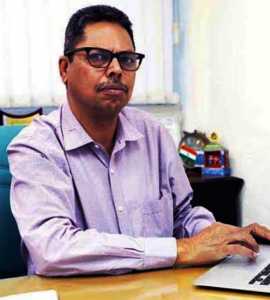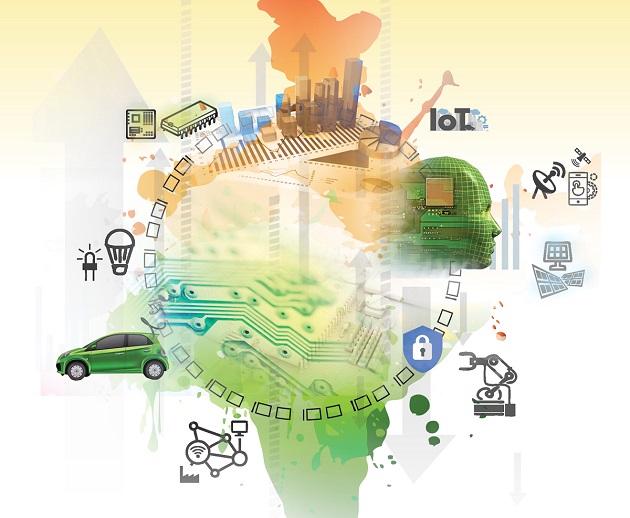Known for his meticulous, hands on approach in almost all verticals in electronics industry be it product positioning, product development, R&D, manufacturing or sales and as well as his tireless work ethics, N. K. Mohapatra has a trail of achievements that span his almost four-decade career and a technocrat in current assignment as the CEO of electronic sector Skills Council of India (ESSCI), his unstinting effort and personal commitment has ensured that ESSCI is on an inspiring trajectory of growth.

Below are the exerpts of the conversation:
Question: Many US & European companies seeking to move manufacturing base from China to India due to Covid-19 and other reason. How would it create an opportunity for the electronics sector?
N. K. Mohapatra: The India Story of taking a global lead in manufacturing of electronics components and equipment becomes more relevant in the current scenario with the world affected by the CIOVID-19 pandemic and lockdown.
With the socio- economic landscape changing and the global political scene being realigned a lot of American and European industry is considering migrating from China and India offers an excellent alternative with its inherent advantage of more than 60% of the population being in the working age group, a huge Consumption Market, Strong Design and R&D Capability in Select Products – Auto electronics, industrial etc., Government Schemes generating a Good Demand – tablets for education sector, Digital India, broadband push etc. an adequately Developed EMS Industry – to be a significant contributor to ecosystem development and last and not the least an enormous Resident Talent in Semiconductor Design and Embedded Software.
The current scenario is expected to lead to a significant Local Demand as a Influencer for Investment Attraction and the rising manufacturing costs in China will lead to India emerging as a leading an alternate Destination.
Question: Recently government launched few schemes dedicated to Electronics sector. How did you see these?
N. K. Mohapatra: The government policies and schemes like the – PLI, SPECS, EMC 2.0 etc. favor attracting Manufacturing Investments and there is a big Export Potential waiting to be exploited with a huge consumption market in the middle East, emerging growth markets of North Africa and Latin America huge migration to Digital and Remote Service.
The industry is very positive about the move and these schemes will help meet targets under NPE (National Policy on Electronics) 2019. Also, it is imperative that the government bring the major electronics ecosystem on board through these schemes. The interruption in the global supply chain due to the pandemic gives India an opportunity to increase export-led manufacturing and broadening the scope of PLI to all other major sectors of electronics, such as consumer electronics, computers, medical electronics, etc., will be a game-changer.
The NPE 2019 is a redefining policy which seeks to create immediate opportunities and apart from the schemes for large units, a huge initiative to create an holistic eco-system to support the large manufacturing is sought to be created and this would be under the MSME sector. The Scheme for Promotion of Manufacturing of Electronic Components and Semiconductors (SPECS) has an ambitious target of creating over 6,00,000 jobs and the Modified Electronics Manufacturing Clusters Scheme (EMC 2.0), which seeks to strengthen the infrastructure base for the electronics industry and deepen the electronics value chain in India and generate 10,00,000 jobs would be of great benefit to the Electronics Industry.
Question: How India can become self-reliant in electronics sector? In which sub sector skill training would be needed?
N. K. Mohapatra: The next five years are going to be extremely exciting as far as electronics sector is concerned. The Council is ion the process of reinventing itself and deeply studying the trends which are going to define the electronics sector.
The National Policy for Electronics 2019 specifically launches the Production Linked Incentive Scheme (PLI) for Large Scale Electronics Manufacturing. PLI for Large Scale Electronics Manufacturing proposes a financial incentive to boost domestic manufacturing and attract large investments in the electronics value chain and aims to create over Jobs. The jobs expected to be created would be mostly be related to the factory manufacturing job roles for assembly line operators, PCB assembly, EMS operators, maintenance engineers and trained in robotics, automation and Industry 4.0 related job roles.
Production Linked Incentives of up to INR 40,951 crores will be awarded over a period of 5 years for Mobile Phone, Specified Electronic Components includes Medical Electronics, SMT components Discrete semiconductor devices including transistors, diodes, thyristors, etc., Passive components including resistors, capacitors, etc. for electronic applications, Printed Circuit Boards (PCB), PCB laminates, prepregs, photopolymer films, PCB printing inks, Sensors, transducers, actuators, crystals for electronic applications, System in Package (SIP) Micro / Nano-electronic components such as Micro Electromechanical Systems (MEMS) and Nano Electromechanical Systems (NEMS) and Assembly, Testing, Marking and Packaging (ATMP) units.
The following are the products which are expected to bring about a huge demand post Covid-19 and the government has formed an immediate action plan to promote these products to channelize the industry for achieving the goals set in the NPE 2019
- Consumer Electronics & IT Hardwar:
-
- Remote Based Customer care services
- Contactless / IoT based services solution
- Surveillance & Monitoring
- DIY based learning & solution.
- Medical Electronics
- Installation & Commissioning of Ventilators, Mini ICU, Sanitisation chambers/tunnels, Thermal Scanners
- Smart Cities
- Centralised Security & Surveillance through NOC or Command Centre,
- E-M Governance services delivery through e-Library
- Smart classrooms
- IoT
- Big data Analysis
- M2M communication
- SCADA System
- Automation
- Industry 4.0 & Smart manufacturing
- Machine Safety through Automation
- R&D manufacturing
- Research & Design through Data Science Methodology
- Export certification
Ease of doing business and promoting volume manufacturing in electronic export market.
Question: This is a very tough time for every sector and council. How ESSCI reinventing itself during Covid-19 pandemic?
N. K. Mohapatra: The Electronics Sector skills Council of India (ESSCI) is highly determined to overcome the impediments imposed by the current Covid-19 pandemic and the countrywide lockdown and has worked upon a plan to ensure minimal effect on its operations and deliverables. The ESSCI has been able to place over 2000 candidates in the industry under the apprenticeship programme during the pandemic period from April to June and also been able to service the electronics industry with supply of skilled manpower through the ESSCI job portal (https://jobportal.essc-india.org/), which has found traction during the period. Some notable industries engaged with manpower through ESSCI-Job Portal are UrbanClap, VVDN, TVS electronics, Godrej India, Havells India. Similarly, other companies preferred ESSCI trained youth to restore products and services.
Question: What are some of the biggest challenges you are facing in up-skilling people and how are you navigating through these challenges?
N. K. Mohapatra: The biggest challenge in up-skilling people is to mobilize large number of people of the same qualification and requiring the same up skilling. The council of identifying key projects and one such project where ESSCI is up skilling and certifying 1,00,000 AC technicians in the best practices and use of environment friendly gases under the HMPM project in partnership with the ozone Cell under Ministry of Environment, Forests and Climate Change.
The current Covid pandemic and resultant lockdown has put the council under tremendous pressure to ensure supply of skilled manpower in the current situation and the pandemic making it difficult to conduct training physically.. The management has refined the working style and the team is working overtime. The work from home is contributing to efficiency and productivity with online tools like Zoom / Google meeting happening twice a day for review and all groups formed to work on specific tasks which have emerged in the Covid-19 lockdown and pandemic
The council has embarked upon developing a robust delivery mechanism using their state of the art Learning Management System- LMS for delivery of training online and through remote mechanism of using IT and digital tools with AR/VR, DIY, Videos and host of easy learning tools.
Question: Any information you would like to share with our readers?
N. K. Mohapatra: The current Pandemic has resulted in the Electronics Industry gaining momentum and opportunities for job and business emerging is a silver line the dark cloud. The Electronics Sector is a sun rise sector currently and is expected to grow in the coming months.
The immediate trends in the sector are expected to be development of contactless Customer care remote services , Online videos solution / IoT based solutions through cloud computing for remote troubleshooting , Installation & Commissioning of affordable Intensive health care unit (Ventilators , Mini ICU) at home, Education and assessment through online learning management platform, DIY Kits based learning models for school students, Virtual labs Simulated with AR / VR technology for Higher education , Use of IoT for remote process management, Advancement in networking solutions and cybersecurity, Computer literacy beyond PMG- Disha and rural entrepreneurship, Personal Hygiene based solutions ( Sanitization Tunnels , Thermal Scanning through Drones etc ) for offices & market places, Faster adoption of Industry 4.0 & Data Analytics in ESDM industries thus bringing about a new energy and opportunities in the sector.







